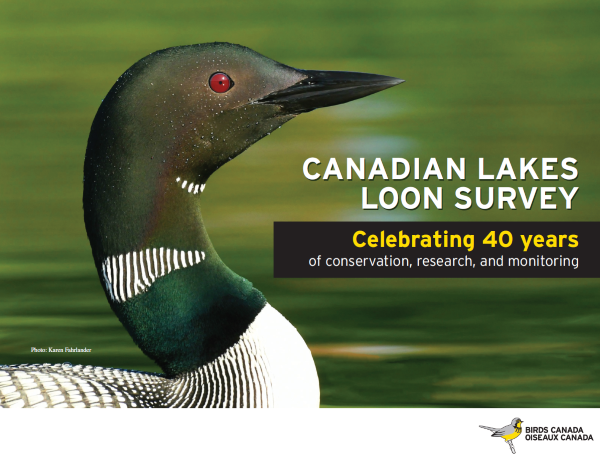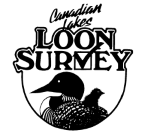Horseshoe Lake Property Owners Association (HLPOA) |
- Home
- Lake Health
- Loon Program
Loons
Loons fulfill the same role for a lake that the canary fulfilled in the mines: it acts as an indicator of environmental conditions.
Did you know that 2 dead loons and several ducks washed up on our shorelines in 2022?
We are not sure of the cause of death of the second loon or the ducks, however it is rare for loons to wash up on our shores. The first dead loon was transported to the University of Guelph where it underwent a full diagnostic assessment. The cause of death for this loon was determined to be lead poisoning from a lead sinker. This is not a surprise as lead sinkers have been identified as a major killer of loons. Please see the link from another cottage association that actually had a grant to buy back tackle that contained lead. There is some good information about why lead tackle is dangerous to loons and other wildlife. https://wolfelake.org/fish-lead-free. Using lead free tackle is critical to the ongoing health of our loons.
As identified in the recent HLPOA survey it was very reassuring to see that ensuring the health of the loon population is important to the property owners on Horseshoe Lake. Just like you these loons have been returning to our lake for many years. If you watched the documentary, Loons: A Cry from the Mist, loons were tracked (through tagging) to the same location. The one set had reunited for over 25 years at the same location. This is also happening on our lake.
Did you know that:
· 97 per cent of the world’s common loon population lives in Canada; 56 per cent of these in Ontario and Quebec.
· A loon’s life expectancy is 15-30 years
· Loons don’t mate until they are 6-7 years
- Loons are visual hunters; the clearer the water the easier it is for them to find their prey
Canadian Lakes Loon Survey (CLLS) monitoring of loon reproductive success has proven effective for monitoring broader lake health. In fact, survival of loon chicks is a good indicator of the impact of lake acidification and other water conditions on fish stocks and aquatic life.
In a recent Cottage Life article, Birds Canada states the loon population has been decreasing over the years. This has been determined from data gathered (by volunteers) for over 30 years from the Annual Loon Survey across Canada. Fewer baby loons (loonlets) are born. We continue to participate in the loon survey annually – thank you Andy Campbell!
We are responsible for conservation of the Common Loon. Human disturbance and development are ongoing threats to loons. There are many activities that are detrimental to loons, including: disturbance of nesting sites (as a result of boats, canoes/kayaks, personal watercraft, and water level changes); entanglement in discarded debris (fishing lines and domestic garbage); nest predation due to attracting and support of nest predators (raccoons, skunks, and gulls); and displacement of loons through habitat loss. Reproductive success data from the Canadian Lakes Loon Survey clearly show that the number of chicks that each pair produces each year has been declining over time.
Ultimately, local human disturbance can be minimized when people are sensitive to the needs of loons.
What Can You Do To Help?
- Keep it Wild- Let native wetland plants grow along your shoreline, or replant if the shoreline is bare. Natural shorelines provide shelter and food for both fish and loons.
- Keep it Calm - Slow down near wetlands and shorelines and keep your wake to a minimum. Wakes can wash out nests or separate young loons from their parents, which makes chicks easy pickings for predators.
- Steer Clear - Slow down and steer clear of loons, waterbirds, and other wildlife. Give a 200 foot berth or more as they may not be able to escape your path. If adults become separated from their young, they can’t protect them.
- Dispose Responsibly - Take trash and fishing line to shore for proper disposal. Garbage including plastics and tackle can injure birds and other wildlife. Keep food and scraps contained, as they may increase predators around nests. Ensure that your tackle is lead-free.
- Reduce Your Impact - Use less electricity and fossil fuels. Climate change raises lake temperatures, which causes more heavy metals to accumulate in wildlife tissues. Do not add pollutants, such as household hazardous wastes, to our rivers and lakes. Don’t use fertilizer on your lawns as it can leach into the lake, fuel growth of algae, and reduce water clarity, making it hard for loons to find fish.
- Get Involved - Be an advocate for loons and lakes. Please keep an eye open for the loons on our lake and let Andy Campbell know (andy@andycampbell.ca) if you are aware of nesting pairs followed by babies as the season unfolds. Last year there were three nesting pairs at the start of the season, however, only one loonlet made it to the end of the season. This information will be submitted to Birds Canada.

Dear Carol,
It is with great pleasure that I give you the first opportunity to see the Canadian Lakes Loon Survey 40-year report. This report, written by Dr. Kristin Bianchini, Dr. Doug Tozer, Rob Alvo, Satyendra Bhavsar, and Dr. Mark Mallory, reviews the latest results from the program, including how loons are faring nationally and regionally, and what you can do to help. Thank you to each and every one of you for your effort to conserve loons and healthy lake ecosystems.
Feel free to share the report with friends, colleagues, or your lake association. Here are some tools to help:
• Full report: https://www.birdscanada.org/wp-content/uploads/2021/08/CLLS-40-yr-report-FINAL-EN.pdf
• Video: https://youtu.be/hFEjkiy_IT4
• Media release: https://www.birdscanada.org/our-canadian-icon-needs-our-help/
• Social media: https://drive.google.com/drive/folders/1bbiDJ6RBNpPvcMfElGrDwnXifqbL453W?usp=sharing

